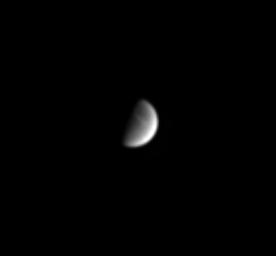
|
Dione’s Streaky Side
- Click the image above for a larger view
- Full-Res JPEG (569 x 527) (4.6 kB)
- Full-Res TIFF (569 x 527) (34.1 kB)
Caption:
Dione shows Cassini some of the bright wispy streaks that cover much of the moon's trailing hemisphere. The streaks are thought to be deposits of icy material that has been extruded onto the moon's surface from the interior. Dione's diameter is 1,118 kilometers (695 miles) across.
The image was taken in visible light with the Cassini spacecraft narrow angle camera on Sept. 28, 2004, at a distance of 7.3 million kilometers (4.5 million miles) from Dione and at a Sun-Dione-spacecraft, or phase, angle of 79 degrees. The image scale is 44 kilometers (27 miles) per pixel. The image has been magnified by a factor of four to aid visibility.
Background Info:
The Cassini-Huygens mission is a cooperative project of NASA, the European Space Agency and the Italian Space Agency. The Jet Propulsion Laboratory, a division of the California Institute of Technology in Pasadena, manages the Cassini-Huygens mission for NASA's Science Mission Directorate, Washington, D.C. The Cassini orbiter and its two onboard cameras were designed, developed and assembled at JPL. The imaging team is based at the Space Science Institute, Boulder, Colo.
For more information, about the Cassini-Huygens mission visit, http://saturn.jpl.nasa.gov and the Cassini imaging team home page, http://ciclops.org .
Cataloging Keywords:
| Name | Value | Additional Values |
|---|---|---|
| Target | Dione | |
| System | Saturn | |
| Target Type | Satellite | |
| Mission | Cassini-Huygens | |
| Instrument Host | Cassini Orbiter | |
| Host Type | Orbiter | |
| Instrument | Imaging Science Subsystem (ISS) | |
| Detector | Narrow Angle Camera | |
| Extra Keywords | Grayscale, Visual | |
| Acquisition Date | ||
| Release Date | 2004-11-04 | |
| Date in Caption | ||
| Image Credit | NASA/JPL/Space Science Institute | |
| Source | photojournal.jpl.nasa.gov/catalog/PIA06513 | |
| Identifier | PIA06513 | |
